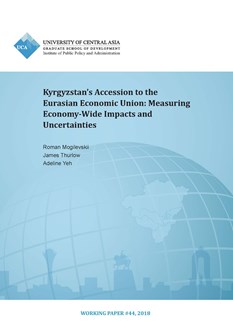Kyrgyzstan’s Accession to the Eurasian Economic Union: Measuring Economy-Wide Impacts and Uncertainties
Joining the Eurasian Economic Union (EEU) has major economic implications for Kyrgyzstan, a small economy in which foreign remittances and profits from re-export trade generate almost a third of the national income. Most EEU studies overlook Kyrgyzstan or focus on specific impact channels, such as changes in tariffs, re-exporting, or migration. We use a computable general equilibrium model to estimate the net impact of multiple channels. We incorporate uncertainty into our analysis using a stochastic simulation procedure and empirically-informed impact distributions. The results indicate that accession is expected to reduce national welfare, because falling profits from re-exporting outweigh higher migrant remittances and tariff revenues. There is, however, a one-in-four chance that national welfare increases, as well as a strong likelihood that poor households benefit from accession. Achieving these gains depends on the successful integration of regional labor markets, not just product markets, and on the proposed Russia-Kyrgyzstan Development Fund. Our recommendations apply to other small Central Asian economies considering joining the EEU.









